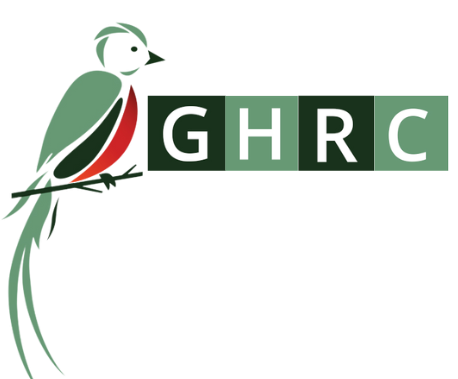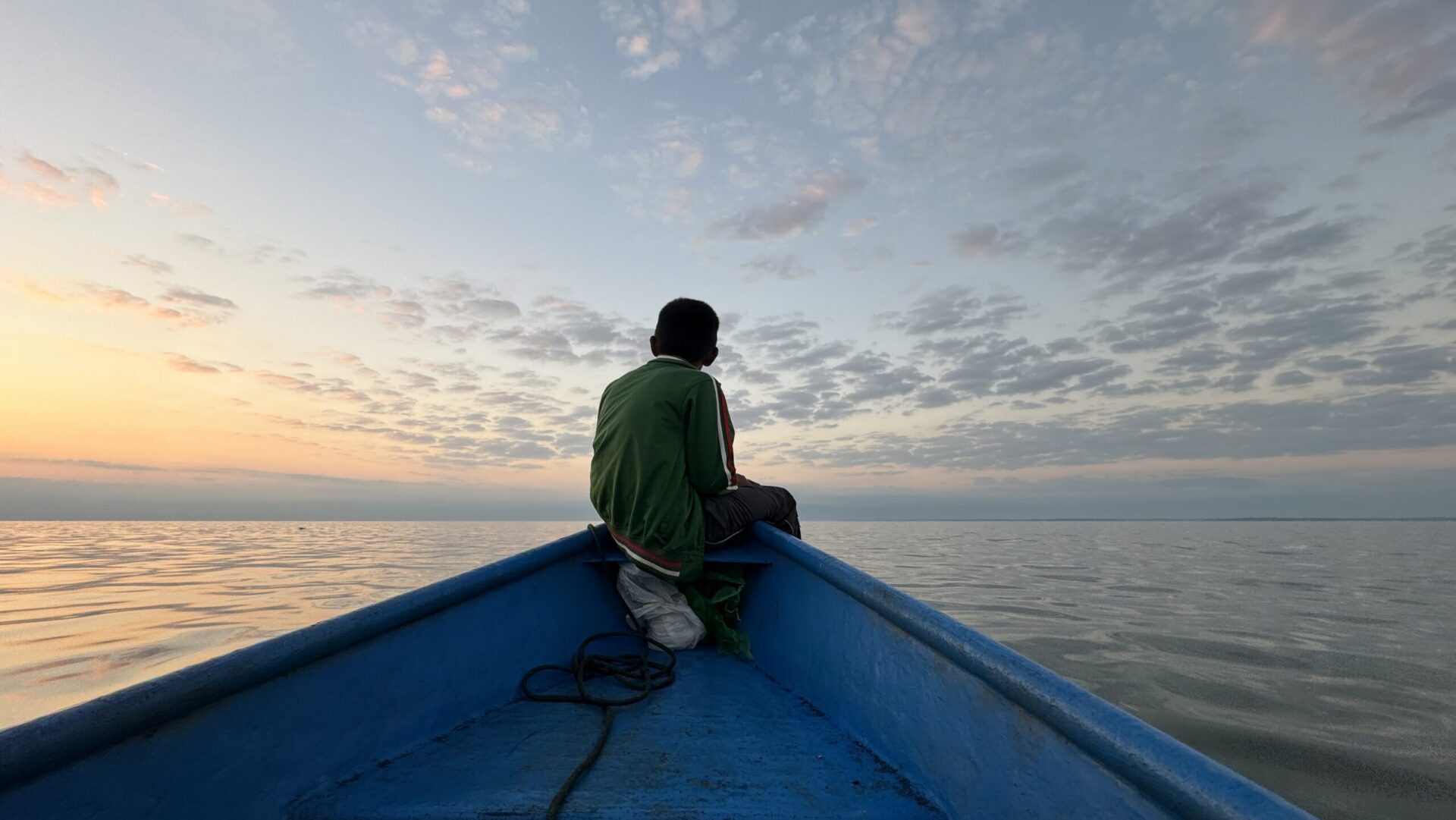Under the state of siege in El Estor–declared by President Giammattei and approved by Congress on October 25–community leaders and journalists fear for their lives. As part of a strategy of intimidation, police have followed community members, raided their homes, and harassed their families. The state of siege was imposed after anti-mining protesters were violently repressed by thousands of security forces on October 23. Indigenous authorities had established an encampment to block the passage of mining materials to a mine declared to be illegally operating since 2005 by the Constitutional Court, given the failure of the mining company to conduct a consultation process with the surrounding impacted communities.
Last week, our Guatemala team visited El Estor to document human rights violations occurring under the police occupation imposed by the State of Siege. One community member reported a violent raid on her home by police who were accompanied by Public Ministry officials, who targeted her young son. She told our team, “While they were interrogating me, other policemen followed my little son…they grabbed my 8 year old son from behind, and they squeezed him hard by the arms,” and when he failed to answer their questions, “they beat him some more.” Two young girls recounted being sexually harassed by police officers. Recalling her experience, one girl explained that “a policeman took our bras and put them on their chests, they put our panties in front of their genitals and looked at us and laughed and said vulgar things” and that “one of them approached me and touched my chain that was around my neck, and I told him not to touch me, and then they threw me forcefully down on the bed.”
Community members whose homes were raided reported the sudden and suspicious deaths of their livestock. One family told our team, “We don’t know what they gave them, but they are dying, now in the morning I buried the mother [pig] who died and the others already look sick.” Another family has lost five roosters to illness since the police raided their home, stating, “We don’t know if they gave them something, but our animals are dying.”
The Inter-American Commission on Human Rights denounced the state of siege, reminding “the State of Guatemala that this type of measure is exceptional and must be adapted to the requirements of international law and that it does not constitute a sustainable and effective response to face and resolve social or political conflicts.” In a statement published on October 4, the Commission condemned human rights violations committed against indiegnous defenders and demanded respect for “the unique relationship between indigenous peoples and their territories [that] has been widely recognized in international human rights law.” Frontline Defenders and the Unit for the Protection of Human Rights Defenders (UDEFEGUA) condemned the violence against defenders, calling on “the Guatemalan authorities to stop and condemn police brutality against protesters, their families, people who exercise legitimate journalistic work, as well as the right to protection of civil society.”
USAID Announces $300m Investment Initiative in Northern Triangle
On November 4, USAID Administrator Samantha Power gave the keynote address at Georgetown University, announcing the new priorities for USAID under the Biden administration. To make USAID more responsive, she revealed three major goals: first to broaden and diversity partners and staff, second to shift USAID’s focus to prioritize the needs of the most marginalized, and finally to listen to partners in partner countries. She announced the creation of various different programs, including a plan to “launch a centralized, flexible fund devoted to private sector engagement,” which, according to Powers, “will allow us to be far more nimble and strategic in mobilizing businesses around the world to advance our core priorities.”
Powers also revealed USAID’s newest initiative to combat root causes of migration–Centroamerica Local–which will invest $300 million over five years in Guatemala, Honduras, and El Salvador. Aimed at empowering local organizations in the region, USAID plans to invest these funds into “programs to advance sustainable and equitable economic growth, improve governance, fight corruption, protect human rights, improve citizen security, and combat sexual and gender-based violence.” According to the agency, “USAID is committed to strengthening local partners and providing hope and opportunity so that the people of the region can confidently build their lives at home to advance the vision laid out by Vice President Harris.” Funds will supposedly be invested in local organizations; specifics on how and exactly to whom these funds will be invested has not been announced yet.
Indigenous Defenders Condemn their Exclusion from COP26 Discussions
The 26th Conference of Parties to the UN Framework Convention on Climate Change (COP26) began in Glasgow on October 31, and for the past two weeks international leaders have been engaged in dialogue to set the global agenda on climate change for the next ten years. Noting the clear absence of Indigenous defenders from the discussions, human rights and Indigeneous organizations condemned their exclusion. While 503 people with links to the fossil fuel industry were accredited for COP26, members of many groups representing Indigenous peoples–including the Indigenous Future Collective–were denied full access to the conference and forced to watch the discussions virtually. (Read more on our blog.)
Environmental defenders on the front lines of fighting climate change continue to face deadly consequences for their work protecting their ancestral territory and the environment. During the first week of COP26, Indigenous activists held a vigil for the 1,005 environmental defenders murdered in the last five years. In 2020 alone–according to Global Witness–227 defenders were murdered. Last year was the deadliest year on record for defenders, yet the first draft of the Glasgow decision made no reference to the grave situation faced by those defending the environment. According to Susi Bascon, Director of Peace Brigades International UK, “The knowledge, perception, and invaluable experience of environmental human rights defenders can no longer be ignored . . . Partnering with them is a must.”
Calling out the reliance on the very mechanisms that created the climate crisis to begin with, Indigenous and environmental defenders denounced “nature-based solutions” which promote private projects that threaten to further inflict violence in their territories. In an interview with Democracy Now! Maya K’iche’ journalist Andrea Ixchíu denounced these solutions as a continuation of colonialism, which will be “implemented through violence and without consultation.” She demanded the recognition of Indigenous communities as “living solutions” to climate change and their participation as decision makers.
GHRC Supports Request to Guatemalan Government to Allow IACHR Site Visit
On November 10, the Human Rights Ombudsman’s Office, supported by international organizations, sent a request to the Ministry of Foreign Affairs and the Presidential Commission for Peace and Rights of Guatemala (COPADEH) to “invite the Inter-American Commission on Human Rights (IACHR) to visit the country.” Fourteen human rights organizations, including GHRC, signed onto the request, emphasizing the need for action in the face of continued attacks against independent judges and prosecutors. Expressing a desire to facilitate a constructive dialogue with the State, as well as concerns about judicial independence, the Commission had suggested a site visit during a hearing that took place on October 28. The hearing–featuring testimonies from independent judges and prosecutors at risk for their work fighting corruption and impunity–was hosted by the IACHR and addressed the threats to the judicial system in Guatemala.

